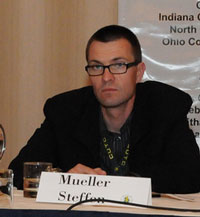 Recent studies show the significant efficiencies spurred by growth and development in the ethanol industry, according to the National Corn Growers Association (NCGA).
Recent studies show the significant efficiencies spurred by growth and development in the ethanol industry, according to the National Corn Growers Association (NCGA).
“As we see it, this is just the tip of the iceberg,” said NCGA First Vice President Bart Schott. “Ethanol has proven to be an advantageous green alternative to foreign and ecologically precarious sources of petroleum. These studies illustrate that innovations in agriculture and ethanol production will only further enhance ethanol’s desirability as an energy resource worthy of continued support.”
Some of that research was presented at the recent 2010 Corn Utilization and Technology Conference (CUTC) in Atlanta. Dr. Steffen Mueller, Principal Research Economist for the Energy Resources Center at the University of Illinois at Chicago, did two presentations at the CUTC, both related to the increasing efficiency of ethanol production that continues to improve its carbon footprint under life cycle analysis. For one, Mueller says, the more useful co-products that can result from ethanol production, the better its carbon footprint.
 “With corn ethanol you also produce an animal feed product simultaneously, to which you have to assign a co-product credit, meaning you subtract the emissions to produce that feed product from the life cycle of corn ethanol,” Steffen explained in an interview. “Now, we’re also looking at other co-products. For example, a lactate which is a solvent that can substitute for petroleum-based solvents in the marketplace.”
“With corn ethanol you also produce an animal feed product simultaneously, to which you have to assign a co-product credit, meaning you subtract the emissions to produce that feed product from the life cycle of corn ethanol,” Steffen explained in an interview. “Now, we’re also looking at other co-products. For example, a lactate which is a solvent that can substitute for petroleum-based solvents in the marketplace.”
Mueller also presented his findings from a recent study showing how ethanol plants are improving in efficiency. “We did a large survey of corn ethanol plants and assessed the energy consumption and showed that the thermal and electric energy that plants require to turn bushels of corn into corn ethanol has decreased by 30 percent over the last eight years,” he said. (read about that survey here)
Mueller says there is a lot of updated industry data coming together that shows that corn ethanol is becoming more efficient, which should help when it comes to regulations for low carbon emissions on both the national level and in states like California.
Listen to or download an interview Chuck Zimmerman did with Steffen Mueller at CUTC here: Steffen Mueller Interview

